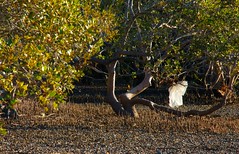 The kind of discussion we need to have around the campfire with every person. Image by JelleS via Flickr
The kind of discussion we need to have around the campfire with every person. Image by JelleS via Flickr
Wednesday, June 10, 2009
A message to the nearly converted (Jason Bradford)
Help Stop the Lockup of Prime Urban Farmland in Salem
 (click on map for larger view)
(click on map for larger view)Mark your calendars for the City Council meeting on Monday, June 22nd, as we need a bunch of folks to head down there and persuade the City Council to proceed a little more carefully with respect to the future of Minto Island:
The City of Salem is rushing to unwisely lock up fertile urban farmland to get some federal stimulus money. This land has been farmed for over a century. The value of the stimulus money to Salem residents will be much less than that resulting from sustainable farming of this large tract of publicly owned urban land.
Hasty Rush for Stimulus
Immediate Choices with Permanence
The federal stimulus package enacted on February 17, 2009 includes payments for landowners agreeing to permanently remove parcels of farmland from production. The Salem City Council applied for stimulus funds by offering to end farming on 150 acres of Minto Island farmland along with another 150 acres of sloughs and other park land. The 300 acres is about one-third of the Minto Brown city park. The City staff nearly doubled the size of the proposal to 592 acres and if this expansion is approved on June 22nd by the City Council, then use of two-thirds of the Park will be controlled by federal restrictions placed on the property deed.Salem's Continuing Farm Legacy
The urgency to get and spend stimulus funds means that Salem has had virtually no public involvement. Nor has Salem considered the long-term result of permanently locking up highly productive, close-in urban farmland.
150+ Years of Farm History
Over half of the City-owned Minto Brown Island property of almost 900 acres has been farmed at times for the last 150 years. About 240 acres have been successfully farmed for the last 23 years. The farmland is very productive; the periodic flooding nourishes and adds to the soil. The annual yield from the farmland has produced tons of beans, corn and wheat per year.Jobs: Short-Term/One-time vs. Long-Term Use
Marion County is still the top agriculture county in Oregon. As farmland within an urban growth boundary in the Willamette Valley, Minto Brown farmland is a tremendous resource that should be carefully husbanded and protected for future centuries of farm use. Our budget woes will come and go, but the people of Salem will always need fresh food.
Local food production builds jobs, community strength
A dollar spent on food in Salem that goes for food grown in the Willamette Valley generates 87 cents of additional local economic activity, compared to food that is grown outside the valley. This includes activities related to growing and processing the food.Local Food is Better Food
The work funded with the federal stimulus funds is short term---but it requires taking the land out of food production forever, meaning that not only do we lose the value of the land, but also the jobs that depend on farm production and processing.
Fresher, More Nutritious, Tastier, Less Energy Required
The energy invested in growing and consuming the same vegetables within 100 miles is much less in terms of transportation and storage then that invested in vegetables that travel an average of 1,500 miles. In America, our systems for growing and shipping food are so out of whack that the average calorie we eat consumed an additional ten calories of energy making its way to your fork --- so if you eat a 2000 calorie diet every day, your diet represents 20,000 calories a day of energy consumption (mostly fossil fuels).
Recharge Salem (interest survey)
 NiMH batteries have good power characteristics, hold a charge well even when not used for a long time, and can be recharged hundreds of times. Image via Wikipedia
NiMH batteries have good power characteristics, hold a charge well even when not used for a long time, and can be recharged hundreds of times. Image via Wikipedia
(NiMH batteries are the kind that hold their charge well and can be reused hundreds of times.)
Here at LOVESalem HQ we've been thinking about how to eliminate the flood of disposable batteries for some time. Only recently have rechargeable batteries become really good alternatives, but many people still think about nickel-cadmium rechargeables, which were not so good. So there's a bias against rechargeables that we have to overcome.
The idea is that, if we can offer people good-quality rechargeables for less than they spend now on throwaways, we can eliminate a big source of toxic waste that we generate.
So take the survey and help design the system!
Sad but true: Humans prefer cocky to expertise
 Even talking about uncertainty can make you seem like an egghead. Image via Wikipedia
Even talking about uncertainty can make you seem like an egghead. Image via Wikipedia
Meanwhile, blowhards (like those who pooh-pooh evidence that we are destabilizing the climate on the only planet we've got) can duplicate the confidence without any of the expertise:
The findings add weight to the idea that if offering expert opinion is your stock-in-trade, it pays to appear confident. Describing his work at an Association for Psychological Science meeting in San Francisco last month, Moore said that following the advice of the most confident person often makes sense, as there is evidence that precision and expertise do tend to go hand in hand. For example, people give a narrower range of answers when asked about subjects with which they are more familiar (Organizational Behavior and Human Decision Processes, vol 107, p 179).
There are times, however, when this link breaks down. With complex but politicised subjects such as global warming, for example, scientific experts who stress uncertainties lose out to activists or lobbyists with a more emphatic message.
UN official joins the chorus: Bag the bags
 The "Plastic Bag Tree" -- America's favorit. Image by Leonard John Matthews via Flickr
The "Plastic Bag Tree" -- America's favorit. Image by Leonard John Matthews via Flickr
"Single use plastic bags which choke marine life, should be banned or phased out rapidly everywhere. There is simply zero justification for manufacturing them anymore, anywhere," said Achim Steiner, executive director of the U.N. Environment Programme. His office advises U.N. member states on environmental policies.
Steiner's declaration accompanied a UNEP report that identifies plastic as the most pervasive form of ocean litter. According to the report, "Plastic, the most prevalent component of marine debris, poses hazards because it persists so long in the ocean, degrading into tinier and tinier bits that can be consumed by the smallest marine life at the base of the food web."
The ban is already being tested in China, where retailers giving out thin bags can be fined up to $1,464. According to one nationwide survey, 40 billion fewer plastic bags were given out in grocery stores after the law's enactment. In addition, Ireland managed to cut single-use plastic bag consumption 90 percent by levying a fee on each bag that consumers use.
In the United States, only San Francisco has completely banned plastic bags; Los Angeles will do so in 2010. Also, the city council in Washington, D.C., is set to vote on a five-cent-a-bag tax later this month. On first reading, the bill passed unanimously. Similar proposals have failed in New York and Philadelphia.

![Reblog this post [with Zemanta]](http://img.zemanta.com/reblog_e.png?x-id=65c37f18-ace1-4cc3-93cc-9e1dffad7617)
![Reblog this post [with Zemanta]](http://img.zemanta.com/reblog_e.png?x-id=3ecb0212-1e95-46d0-b2a0-fb5d15edc899)
![Reblog this post [with Zemanta]](http://img.zemanta.com/reblog_e.png?x-id=48500afa-9521-47e4-b3e6-71585ebd44e3)
![Reblog this post [with Zemanta]](http://img.zemanta.com/reblog_e.png?x-id=66f0c58a-bed8-47d7-ad29-db98d22696dd)
![Reblog this post [with Zemanta]](http://img.zemanta.com/reblog_e.png?x-id=22a2e023-cc88-409b-bbe0-9c144a6f7e8a)



